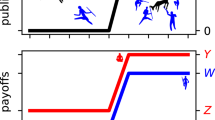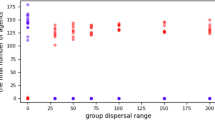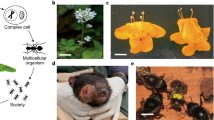Abstract
What conditions favour egalitarianism, that is, muted hierarchies with relatively equal distributions of resources? Here, we combine the hawk–dove and prisoner’s dilemma games to model the effects of economic defensibility, costs of competition and gains from cooperation on egalitarianism, operationalized as the absence of hawks. We show that a ‘leveller’ strategy, which punishes hawkishness in the hawk–dove game with defection in the prisoner’s dilemma, can be evolutionarily stable provided that the gains from cooperation are high relative to the benefits of hawkishness. Under these conditions, rare mutant levellers select for hawks that acquiesce to punishment by playing dove. If these ‘acquiescent hawks’ become common, levellers outperform hawks and establish a new egalitarian equilibrium. An analysis of human foraging groups corroborates these results, as groups with a greater reliance on cooperation are more egalitarian. Cooperation fosters greater equality when individuals can withhold its benefits from would-be dominant individuals.
This is a preview of subscription content, access via your institution
Access options
Access Nature and 54 other Nature Portfolio journals
Get Nature+, our best-value online-access subscription
$29.99 / 30 days
cancel any time
Subscribe to this journal
Receive 12 digital issues and online access to articles
$119.00 per year
only $9.92 per issue
Buy this article
- Purchase on Springer Link
- Instant access to full article PDF
Prices may be subject to local taxes which are calculated during checkout





Similar content being viewed by others
Data availability
The Binford hunter-gatherer data are available at GitHub (https://github.com/benmarwick/binford or https://github.com/systemsscience/egalitarian).
Code availability
Code for the simulations and empirical analysis is available at GitHub (https://github.com/systemsscience/egalitarian).
References
Standen, V. & Foley, R. A. Comparative Socioecology: The Behavioural Ecology of Humans and Other Mammals (Blackwell Scientific Publications, 1989).
Sterck, E. H. M., Watts, D. P. & van Schaik, C. P. The evolution of female social relationships in nonhuman primates. Behav. Ecol. Sociobiol. 41, 291–309 (1997).
Jaeggi, A. V., Boose, K. F., White, F. J. & Gurven, M. Obstacles and catalysts of cooperation in humans, bonobos, and chimpanzees: behavioural reaction norms can help explain variation in sex roles, inequality, war and peace. Behaviour 153, 1015–1051 (2016).
Kelly, R. L. The Lifeways of Hunter-Gatherers: The Foraging Spectrum (Cambridge Univ. Press, 2013).
Kaplan, H. S., Hooper, P. L. & Gurven, M. The evolutionary and ecological roots of human social organization. Philos. Trans. R. Soc. B 364, 3289–3299 (2009).
Wilkinson, R. G. Unhealthy Societies: The Afflictions of Inequality (Routledge, 2002).
Daly, M. & Wilson, M. Homicide (Transaction Publishers, 1988).
Sapolsky, R. M. The influence of social hierarchy on primate health. Science 308, 648–652 (2005).
Brown, J. L. The evolution of diversity in avian territorial systems. Wilson Bull. 76, 160–169 (1964).
Dyson-Hudson, R. & Smith, E. A. Human territoriality: an ecological reassessment. Am. Anthropol. 80, 21–41 (1978).
Packer, C., Pusey, A. E. & Eberly, L. E. Egalitarianism in female African lions. Science 293, 690–693 (2001).
Gintis, H., van Schaik, C. & Boehm, C. Zoon politikon: the evolutionary origins of human socio-political systems. Behav. Processes 161, 17–30 (2019).
Okada, D. & Bingham, P. M. Human uniqueness-self-interest and social cooperation. J. Theor. Biol. 253, 261–270 (2008).
Pandit, S. A. & van Schaik, C. P. A model for leveling coalitions among primate males: toward a theory of egalitarianism. Behav. Ecol. Sociobiol. 55, 161–168 (2003).
Gavrilets, S., Duenez-Guzman, E. A. & Vose, M. D. Dynamics of alliance formation and the egalitarian revolution. PLoS ONE 3, e3293 (2008).
Gavrilets, S. On the evolutionary origins of the egalitarian syndrome. Proc. Natl Acad. Sci. USA 109, 14069–14074 (2012).
Boehm, C. Hierarchy in the Forest: The Evolution of Egalitarian Behavior (Harvard Univ. Press, 1999).
Majolo, B., de Bortoli Vizioli, A. & Lehmann, J. The effect of intergroup competition on intragroup affiliation in primates. Anim. Behav. 114, 13–19 (2016).
Wiessner, P. Levelling the hunter: constraints on the status quest in foraging societies. in Food and the Status Quest (eds Wiessner, P. & Schiefenhovel, W.) 171–192 (Berghahn Books, 1996).
Maynard Smith, J. The theory of games and the evolution of animal conflicts. J. Theor. Biol. 47, 209–221 (1974).
Axelrod, R. & Hamilton, W. D. The evolution of cooperation. Science 212, 1390–1396 (1981).
Kaplan, H. & Gurven, M. The natural history of human food sharing and cooperation. in Moral Sentiments and Material Interests: The Foundations of Cooperation in Economic Life (eds Gintis, H. et al.) 75–113 (MIT Press, 2005).
Kaplan, H. & Hill, K. Food sharing among Ache foragers: tests of explanatory hypotheses. Curr. Anthropol. 26, 223–246 (1985).
Winterhalder, B. Diet choice, risk, and food sharing in a stochastic environment. J. Anthropol. Archaeol. 392, 369–392 (1986).
Gurven, M. & Hill, K. Why do men hunt? A reevaluation of ‘man the hunter’ and the sexual division of labor. Curr. Anthropol. 50, 51–74 (2009).
Hooper, P. L., Demps, K., Gurven, M., Gerkey, D. & Kaplan, H. S. Skills, division of labour and economies of scale among Amazonian hunters and South Indian honey collectors. Philos. Trans. R. Soc. B 370, 20150008 (2015).
Hill, K. Altruistic cooperation during foraging by the Ache, and the evolved human predisposition to cooperate. Hum. Nat. 13, 105–128 (2002).
Woodburn, J. Egalitarian societies. Man 17, 431–451 (1982).
Cashdan, E. A. Egalitarianism among hunters and gatherers. Am. Anthropol. 82, 116–120 (1980).
Boehm, C. Egalitarian behavior and reverse dominance hierarchy. Curr. Anthropol. 34, 227–254 (1993).
Marlowe, F. W. et al. The ‘spiteful’ origins of human cooperation. Proc. R. Soc. B 278, 2159–2164 (2010).
Hill, K. R. et al. Co-residence patterns in hunter-gatherer societies show unique human social structure. Science 331, 1286–1289 (2011).
Marlowe, F. W. et al. More ‘altruistic’ punishment in larger societies. Proc. R. Soc. B 275, 587–592 (2008).
McElreath, R. & Boyd, R. Mathematical Models of Social Evolution: A Guide for the Perplexed (Univ. Chicago, 2007).
van Damme, E. & Weibull, J. W. Evolution in games with endogenous mistake probabilities. J. Econ. Theory 106, 296–315 (2002).
Naidu, S., Hwang, S. H. & Bowles, S. Evolutionary bargaining with intentional idiosyncratic play. Econ. Lett. 109, 31–33 (2010).
Maynard Smith, J. & Price, G. R. The logic of animal conflict. Nature 246, 15–18 (1973).
Hamilton, W. D. The genetical evolution of social behaviour. I. J. Theor. Biol. 7, 1–16 (1964).
Hamilton, W. D. The genetical evolution of social behaviour. II. J. Theor. Biol. 7, 17–52 (1964).
Nowak, M. A. Five rules for the evolution of cooperation. Science 314, 1560–1563 (2006).
Binford, L. F. Constructing Frames of Reference (Univ. California Press, 2001).
Jaeggi, A. V. & Gurven, M. Natural cooperators: food sharing in humans and other primates. Evol. Anthropol. 22, 186–195 (2013).
Duffy, K. G., Richard, W. & Silk, J. B. Male chimpanzees exchange political support for mating opportunities. Curr. Biol. 17, R586–R587 (2007).
Radford, A. N. Duration and outcome of intergroup conflict influences intragroup affiliative behaviour. Proc. R. Soc. B 275, 2787–2791 (2008).
Clutton-Brock, T. H. Mammal Societies. (Wiley-Blackwell, 2016).
Hooper, P. L., Kaplan, H. S. & Boone, J. L. A theory of leadership in human cooperative groups. J. Theor. Biol. 265, 633–646 (2010).
Vehrencamp, S. L. A model for the evolution of despotic versus egalitarian societies. Anim. Behav. 31, 667–682 (1983).
Carneiro, R. L. A theory of the origin of the state. Science 169, 733–738 (1970).
Panchanathan, K. & Boyd, R. Indirect reciprocity can stabilize cooperation without the second-order free rider problem. Nature 432, 499–502 (2004).
Maynard Smith, J. & Parker, G. A. The logic of asymmetric contests. Anim. Behav. 24, 159–175 (1976).
Maynard Smith, J. Evolution and the theory of games. Am. Sci. 64, 41–45 (1976).
Boyd, R. & Lorberbaum, J. P. No pure strategy is evolutionarily stable in the repeated prisoner’s dilemma game. Nature 327, 58–59 (1987).
Nowak, M. A. & Sigmund, K. A strategy of win-stay, lose-shift that outperforms tit-for-tat in the prisoner’s dilemma game. Nature 364, 56–58 (1993).
Nowak, M. A. & Sigmund, K. Evolution of indirect reciprocity. Nature 437, 1291–1298 (2005).
Nowak, M. A. & Sigmund, K. Evolution of indirect reciprocity by image scoring. Nature 393, 573–577 (1998).
Pandit, S. A., Pradhan, G. R. & van Schaik, C. P. Why class formation occurs in humans but not among other primates: a primate coalitions model. Hum. Nat. 31, 155–173 (2020).
Hooper, P. L., Smith, E. A., Kohler, T. A., Wright, H. T. & Kaplan, H. S. Ecological and social dynamics of territoriality and hierarchy formation. in The Emergence of Premodern States: New Perspectives on the Development of Complex Societies (eds Sabloff, J. & Sabloff, P.) 105–130 (SFI Press, 2018).
McNamara, J. M. & Leimar, O. Variation and the response to variation as a basis for successful cooperation. Philos. Trans. R. Soc. B 365, 2627–2633 (2010).
R Core Team R: A Language and Environment for Statistical Computing (R Foundation for Statistical Computing, 2020); https://www.r-project.org
Marwick, B., Johnson, A., White, D. & Eff, E. A. Binford’s Hunter-Gatherer Data. R Package v. 0.1. http://github.com/benmarwick/binford (2016).
Bürkner, P. C. brms: an R package for Bayesian multilevel models using Stan. J. Stat. Softw. 80, 29094 (2017).
Ringen, E. J., Duda, P. & Jaeggi, A. V. The evolution of daily food sharing: a Bayesian phylogenetic analysis. Evol. Hum. Behav. 40, 375–384 (2019).
Minocher, R., Duda, P. & Jaeggi, A. V. Explaining marriage patterns in a globally representative sample through socio-ecology and population history: a Bayesian phylogenetic analysis using a new supertree. Evol. Hum. Behav. 40, 176–187 (2018).
Acknowledgements
We thank M. Hamilton, C. Hauert, G. Wild, D. Bhat, S. Bowles, E. A. Smith, C. van Schaik and S. Gavrilets for input and feedback. P.L.H. was supported by an Omidyar Fellowship at the Santa Fe Institute.
Author information
Authors and Affiliations
Contributions
P.L.H. and H.S.K. conceived the research. P.L.H. developed and analysed the model. A.V.J. analysed the empirical data. P.L.H. and A.V.J. wrote the paper.
Corresponding author
Ethics declarations
Competing interests
The authors declare no competing interests.
Additional information
Peer review information: Primary Handling Editor: Stavroula Kousta.
Publisher’s note Springer Nature remains neutral with regard to jurisdictional claims in published maps and institutional affiliations.
Supplementary information
Supplementary Information
Supplementary Table 1.
Rights and permissions
About this article
Cite this article
Hooper, P.L., Kaplan, H.S. & Jaeggi, A.V. Gains to cooperation drive the evolution of egalitarianism. Nat Hum Behav 5, 847–856 (2021). https://doi.org/10.1038/s41562-021-01059-y
Received:
Accepted:
Published:
Issue Date:
DOI: https://doi.org/10.1038/s41562-021-01059-y
This article is cited by
-
The cognitive challenges of cooperation in human and nonhuman animals
Nature Reviews Psychology (2023)



